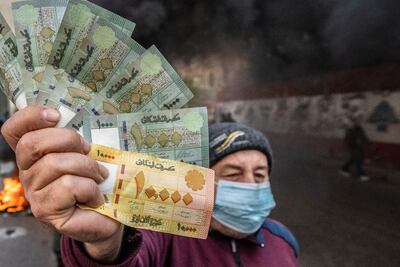Lebanon's central bank governor Riad Salameh was on Wednesday questioned by a judge in Beirut after Interpol last week issued a Red Notice as part of an international corruption investigation.
Imad Kabalan, the attorney general at the Court of Cassation, questioned Mr Salameh behind closed doors.
Mr Salameh was told to surrender his French and Lebanese passports to the judiciary.
He is now banned from leaving the country but remains in his position in the central bank.
The Interpol notice came in response to a request from the French judiciary, which issued an arrest warrant for Mr Salameh on Tuesday after he failed to appear at a hearing in Paris relating to allegations of embezzlement of more than $330 million from Lebanon's central bank.
He was then classified as a fugitive.
Low expectations
Some observers said they had low expectations of the Lebanese judiciary's ability to reach decisions.
Extradition is not on the table as Lebanon is not legally compelled to extradite Mr Salameh, and the country has a long-standing policy of not expelling its citizens.
"But the judge could have decided on Mr Salameh's arrest in Lebanon, place him under house arrest or filed formal accusations," lawyer Karim Daher said.
"This might have sent a positive signal to the European judiciary", he added, stressing that the proceedings are "still in the investigative phase and not at the stage of conviction".
A judicial action from Lebanon could also have had a decisive effect on Mr Salameh's tenure as chief of the central bank.
The executive power shifted the responsibility of his dismissal to the judiciary, with the cabinet saying it needed formal accusations to be issued in Lebanon, despite legal experts suggesting it could dismiss Mr Salameh based on the code of money and credit.

AFP said the Lebanese judge requested the French judiciary to gain access to the whole file related to the case before making any decision to "determine whether the Lebanese judiciary will prosecute him for the crimes he is accused of in France".
Lebanon has already opened an investigation related to the same case of fraud for which Mr Salameh was charged in February with money laundering, embezzlement and illicit enrichment.
"There is already evidence in the Lebanese case against Riad Salameh on which the judge could rely. This should have been sufficient for the Lebanese authorities to take appropriate measures and file formal accusations without additional elements from the French judiciary," Mr Daher said.
Observers said this might lead to a delay in the legal proceedings in Lebanon and push back any decision regarding his dismissal until Mr Salameh's mandate naturally expires at the end of July.
Calls for resignation
Calls demanding that the governor step down are intensifying but the matter remains highly sensitive because Mr Salameh has long enjoyed strong political support since assuming his mandate in 1993.
He denies any wrongdoing and his spokesman said no official communique was released after Wednesday's hearing.
He is suspected of having laundered misappropriated funds with the help of his brother Raja in Europe, where he and his entourage own properties valued in the millions.
On Tuesday, Germany's public prosecutor informed the Lebanese judiciary of another international arrest warrant for Mr Salameh.
European investigators traced the flow of funds from an account at the Lebanese central bank, uncovering a complex network of layering operations that involved among others the Luxembourg and Swiss banking systems to allegedly finance high-end properties in France, Germany, the UK and Belgium.
A team of German, Luxembourg and French investigators was established in 2022 to exchange information, leading in March 2022 to the freezing of assets valued at €120 million ($130 million) related to Mr Salameh and his relatives.
This year, the investigating team has made several visits to Lebanon, gathering evidence and conducting hearings, including with Mr Salameh and his brother.


